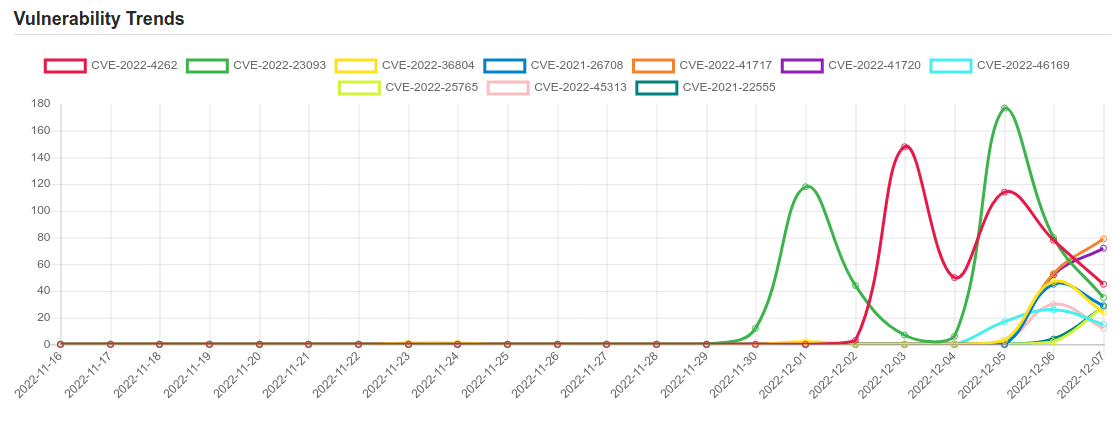Daily Vulnerability Trends: Thu Dec 08 2022

| CVE NAME | CVE Description |
| CVE-2021-22555 | A heap out-of-bounds write affecting Linux since v2.6.19-rc1 was discovered in net/netfilter/x_tables.c. This allows an attacker to gain privileges or cause a DoS (via heap memory corruption) through user name space |
| CVE-2022-46164 | NodeBB is an open source Node.js based forum software. Due to a plain object with a prototype being used in socket.io message handling a specially crafted payload can be used to impersonate other users and takeover accounts. This vulnerability has been patched in version 2.6.1. Users are advised to upgrade. Users unable to upgrade may cherry-pick commit `48d143921753914da45926cca6370a92ed0c46b8` into their codebase to patch the exploit. |
| CVE-2022-41049 | Windows Mark of the Web Security Feature Bypass Vulnerability. This CVE ID is unique from CVE-2022-41091. |
| CVE-2018-14847 | MikroTik RouterOS through 6.42 allows unauthenticated remote attackers to read arbitrary files and remote authenticated attackers to write arbitrary files due to a directory traversal vulnerability in the WinBox interface. |
| CVE-2022-29596 | MicroStrategy Enterprise Manager 2022 allows authentication bypass by triggering a login failure and then entering the Uid=/../../../../../../../../../../../windows/win.ini%00.jpg&Pwd=_any_password_&ConnMode=1&3054=Login substring for directory traversal. |
| CVE-2021-38003 | Inappropriate implementation in V8 in Google Chrome prior to 95.0.4638.69 allowed a remote attacker to potentially exploit heap corruption via a crafted HTML page. |
| CVE-2022-21661 | WordPress is a free and open-source content management system written in PHP and paired with a MariaDB database. Due to improper sanitization in WP_Query, there can be cases where SQL injection is possible through plugins or themes that use it in a certain way. This has been patched in WordPress version 5.8.3. Older affected versions are also fixed via security release, that go back till 3.7.37. We strongly recommend that you keep auto-updates enabled. There are no known workarounds for this vulnerability. |
| CVE-2022-41120 | Microsoft Windows Sysmon Elevation of Privilege Vulnerability. |
| CVE-2022-41 | No description provided |
| CVE-2022-3602 | A buffer overrun can be triggered in X.509 certificate verification, specifically in name constraint checking. Note that this occurs after certificate chain signature verification and requires either a CA to have signed the malicious certificate or for the application to continue certificate verification despite failure to construct a path to a trusted issuer. An attacker can craft a malicious email address to overflow four attacker-controlled bytes on the stack. This buffer overflow could result in a crash (causing a denial of service) or potentially remote code execution. Many platforms implement stack overflow protections which would mitigate against the risk of remote code execution. The risk may be further mitigated based on stack layout for any given platform/compiler. Pre-announcements of CVE-2022-3602 described this issue as CRITICAL. Further analysis based on some of the mitigating factors described above have led this to be downgraded to HIGH. Users are still encouraged to upgrade to a new version as soon as possible. In a TLS client, this can be triggered by connecting to a malicious server. In a TLS server, this can be triggered if the server requests client authentication and a malicious client connects. Fixed in OpenSSL 3.0.7 (Affected 3.0.0,3.0.1,3.0.2,3.0.3,3.0.4,3.0.5,3.0.6). |
| CVE-2022-39396 | Parse Server is an open source backend that can be deployed to any infrastructure that can run Node.js. Versions prior to 4.10.18, and prior to 5.3.1 on the 5.X branch, are vulnerable to Remote Code Execution via prototype pollution. An attacker can use this prototype pollution sink to trigger a remote code execution through the MongoDB BSON parser. This issue is patched in version 5.3.1 and in 4.10.18. There are no known workarounds. |
| CVE-2022-4262 | Type confusion in V8 in Google Chrome prior to 108.0.5359.94 allowed a remote attacker to potentially exploit heap corruption via a crafted HTML page. (Chromium security severity: High) |
| CVE-2022-23093 | No description provided |
| CVE-2022-36804 | Multiple API endpoints in Atlassian Bitbucket Server and Data Center 7.0.0 before version 7.6.17, from version 7.7.0 before version 7.17.10, from version 7.18.0 before version 7.21.4, from version 8.0.0 before version 8.0.3, from version 8.1.0 before version 8.1.3, and from version 8.2.0 before version 8.2.2, and from version 8.3.0 before 8.3.1 allows remote attackers with read permissions to a public or private Bitbucket repository to execute arbitrary code by sending a malicious HTTP request. This vulnerability was reported via our Bug Bounty Program by TheGrandPew. |
| CVE-2021-26708 | A local privilege escalation was discovered in the Linux kernel before 5.10.13. Multiple race conditions in the AF_VSOCK implementation are caused by wrong locking in net/vmw_vsock/af_vsock.c. The race conditions were implicitly introduced in the commits that added VSOCK multi-transport support. |
| CVE-2022-41717 | No description provided |
| CVE-2022-41720 | On Windows, restricted files can be accessed via os.DirFS and http.Dir. The os.DirFS function and http.Dir type provide access to a tree of files rooted at a given directory. These functions permit access to Windows device files under that root. For example, os.DirFS(“C:/tmp”).Open(“COM1”) opens the COM1 device. Both os.DirFS and http.Dir only provide read-only filesystem access. In addition, on Windows, an os.DirFS for the directory (the root of the current drive) can permit a maliciously crafted path to escape from the drive and access any path on the system. With fix applied, the behavior of os.DirFS(“”) has changed. Previously, an empty root was treated equivalently to “/”, so os.DirFS(“”).Open(“tmp”) would open the path “/tmp”. This now returns an error. |
| CVE-2022-46169 | Cacti is an open source platform which provides a robust and extensible operational monitoring and fault management framework for users. In affected versions a command injection vulnerability allows an unauthenticated user to execute arbitrary code on a server running Cacti, if a specific data source was selected for any monitored device. The vulnerability resides in the `remote_agent.php` file. This file can be accessed without authentication. This function retrieves the IP address of the client via `get_client_addr` and resolves this IP address to the corresponding hostname via `gethostbyaddr`. After this, it is verified that an entry within the `poller` table exists, where the hostname corresponds to the resolved hostname. If such an entry was found, the function returns `true` and the client is authorized. This authorization can be bypassed due to the implementation of the `get_client_addr` function. The function is defined in the file `lib/functions.php` and checks serval `$_SERVER` variables to determine the IP address of the client. The variables beginning with `HTTP_` can be arbitrarily set by an attacker. Since there is a default entry in the `poller` table with the hostname of the server running Cacti, an attacker can bypass the authentication e.g. by providing the header `Forwarded-For: |
| CVE-2022-25765 | The package pdfkit from 0.0.0 are vulnerable to Command Injection where the URL is not properly sanitized. |
| CVE-2022-45313 | Mikrotik RouterOs before stable v7.5 was discovered to contain an out-of-bounds read in the hotspot process. This vulnerability allows attackers to execute arbitrary code via a crafted nova message. |
A considerable amount of time and effort goes into maintaining this website, creating backend automation and creating new features and content for you to make actionable intelligence decisions. Everyone that supports the site helps enable new functionality.
If you like the site, please support us on Patreon using the button below


To keep up to date follow us on the below channels.







![[QILIN] - Ransomware Victim: Zimmerman & Frachtman PA Law Firm 7 image](https://www.redpacketsecurity.com/wp-content/uploads/2024/09/image-300x300.png)

